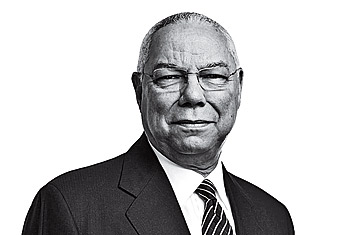
In It Worked for Me, you write that the two months you spent mulling a run for the presidency were the most difficult of your life. Why?
I never had any political aspirations. I'm a career soldier. But then I leave the Army, and my [first] book comes out, and there's this enormous interest in my running for office. I felt something of a guilt trip. A soldier always wants to do what he's supposed to do. But there was not a morning when I put my feet on the floor and said, "This is right for me. This is what I want to do."
Then you endorsed President Obama. Will you again?
I don't know. We'll see.
Do you think leaders in Congress stay on too long?
We need people who know how the system runs, but it really is not necessary to stay there for an entire career. When I was made a three-star general, I was congratulated and told, "Two years from now to the day, if we haven't given you another job or promotion, we expect your resignation on our desk." That's not bad.
Would you like to extend a personal invitation to any member of Congress to leave?
I don't have all of my stationery with me.
Recently we've had military scandals involving prostitutes in Colombia and soldiers mistreating remains. Is this a failure of leadership?
You have to remember that the armed forces are very large, hundreds and hundreds of thousands of young men and women. But most of them are very disciplined. If there was a leader who saw this happening and tolerated it, that is a failure, and senior leadership should do something about it.
In your book you say Feb. 5, 2003, the day you presented the case for war to the U.N., is as burned on your brain as your birthday. Do you feel guilt for the lives lost in the fruitless search for weapons of mass destruction?
I feel bad about any loss of life on either side of the conflict, but I think it was a justified decision based on what we knew at the time. I did it, and as I say in the book, I had to move on. I was still Secretary of State. I couldn't go in a corner and go fetal.
You were in Peru on 9/11 and in Asia when some of the key decisions were made about CIA black sites. Do you think things would have been different had you been around?
It wouldn't have been any different on 9/11. There were some things that took place with respect to interrogation and detention policies that didn't get full discussion and maybe would have had I been there.
Given WikiLeaks, is the Web a net positive for diplomacy?
It's sometimes very, very positive and sometimes very, very negative. But if you're going to live in the 21st century world, it's going to keep up with our kids. The world we're living in is moving at 186,000 miles per second. The challenge I'm having in my own personal life is little cameras. I get followed into places that I shouldn't.
Are you talking about the bathroom?
I'm talking about the bathroom. Or my neighborhood mall. I parked my new car slightly at an angle in order to avoid a pole. A student took a picture of that, and he put it online. It went viral, and people said I couldn't park. The word they used is asshat, a word I'd never heard before.
Post-Iraq invasion, have you made amends with Pottery Barn?
It was a newspaperman who first used the phrase Pottery Barn rule to describe the "You break it, you own it" doctrine, not me. To be clear: the Pottery Barn does not have such a rule.
Feel free to go in there and break anything.
Go break whatever you want. You don't have to pay for it. I didn't say that.
FOR VIDEO OF THIS INTERVIEW, GO TO time.com/10questions
